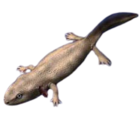Ymboirana
| Ymboirana Temporal range: Oligocene, | |
|---|---|
| Scientific classification | |
| Domain: | Eukaryota |
| Kingdom: | Animalia |
| Phylum: | Chordata |
| Class: | Amphibia |
| Order: | Gymnophiona |
| Clade: | Apoda |
| Family: | Typhlonectidae |
| Genus: | †Ymboirana Santos, Wilkinson, do Couto Ribeiro, Carvalho & Zaher, 2024 |
| Species: | †Y. acrux |
| Binomial name | |
| †Ymboirana acrux Santos, Wilkinson, do Couto Ribeiro, Carvalho & Zaher, 2024 | |
Ymboirana was an extinct genus of caecilian described based on a fossil found in the Oligocene Tremembé Formation (Taubaté Basin), Brazil. The holotype and only known specimen comprises a partially preserved skeleton, including parts of the skull and vertebral column. Ymboirana was identified as an extinct representative of the family Typhlonectidae, a subgroup of caecilians well known because its members, unlike all other living caecilians, exhibit an aquatic or semi-aquatic lifestyle when adults.[1]
References
- ^ Santos, R. O.; Wilkinson, M.; Couto Ribeiro, G.; Carvalho, A. B.; Zaher, H. (2024). "The first fossil record of an aquatic caecilian (Gymnophiona: Typhlonectidae)". Zoological Journal of the Linnean Society. doi:10.1093/zoolinnean/zlad188.




